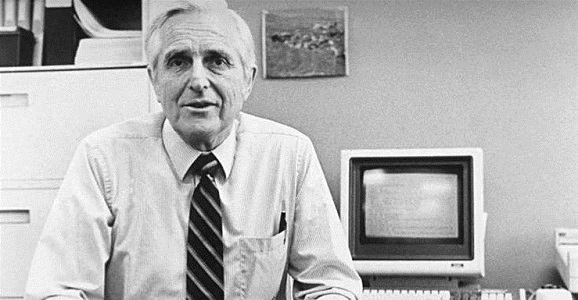R.I.P. Douglas Engelbart, Inventor Of The Mouse
This article is more than 2 years old
 It’s time to get a little maudlin again over here at Giant Freakin’ Robot, as we mourn the death of yet another individual who forever changed the lives of millions with his prescient innovation and imagination. We wouldn’t be here without him.
It’s time to get a little maudlin again over here at Giant Freakin’ Robot, as we mourn the death of yet another individual who forever changed the lives of millions with his prescient innovation and imagination. We wouldn’t be here without him.
Dr. Douglas Engelbart, most widely known for having invented the computer mouse, as well as the precursor to the Internet, died in his Atherton, California home this past Tuesday, at the age of 88. Wife Karen O’Leary Engelbart said kidney failure caused his death.
Back in the 1950s, Engelbart was a young man with an eager mind, ready to bring computers out of the number-crunching shadows. A Navy man, he envisioned a world where people learned information off of screens, and through a shared computing system that could be networked with those in different locations. A proponent of microelectronics, he created a government-funded experimental research group, the Stanford Research Institute (eventually renamed SRI International), around the time of the Vietnam War.
The Institute’s first game changing innovation came in December 1968, when Engelbart and mechanical engineer William English presented a panel at San Francisco’s Fall Joint Computer Conference. Their presentation showcased Engelbart’s ideas for rapid information sharing through networked systems. He displayed all of his ideas using a 22-foot-high video screen and a computer equipped with a keyboard and mouse, which he’d invented four years earlier. English and a draftsman created the first prototype with a pine casing, which should totally make a comeback at some point before things go completely peripheral-free.
The panel has come to be known as “The Mother of All Demos.” Engelbart demonstrated text editing and word processing, video tele-conferencing, hypertext, and dynamic file linking, among other things the world had never seen before. And like all gobsmacking revelations, it took over a decade for this technology to reach the public, as companies like Apple and Microsoft began to make the personal computer as ubiquitous as pen and paper. Perhaps soon computers will be performing the tasks of the human brain, which we probably won’t have in our homes until at least 2014. (Optimism is the mother of accidental invention.)
Amazingly enough, the entire presentation is available to watch on YouTube. Check it out below. Even though it’s a slightly archaic version of the worldwide networking scheme that exists today, this is all still well above my mental pay grade.
I have distinct memories of a time in my childhood, before computers and the Internet evolved from a simple time killing mechanism into the workstation I now shamefully hold up as a personal idol in many ways. And even though inventors like Trevor Baylis think computers are dumbing us down, I find it hard to believe even he wouldn’t consider Engelbart a genius well ahead his time.
Giant Freakin’ Robot points to and clicks open a folder of heartfelt condolences to Engelbart’s family and friends.












